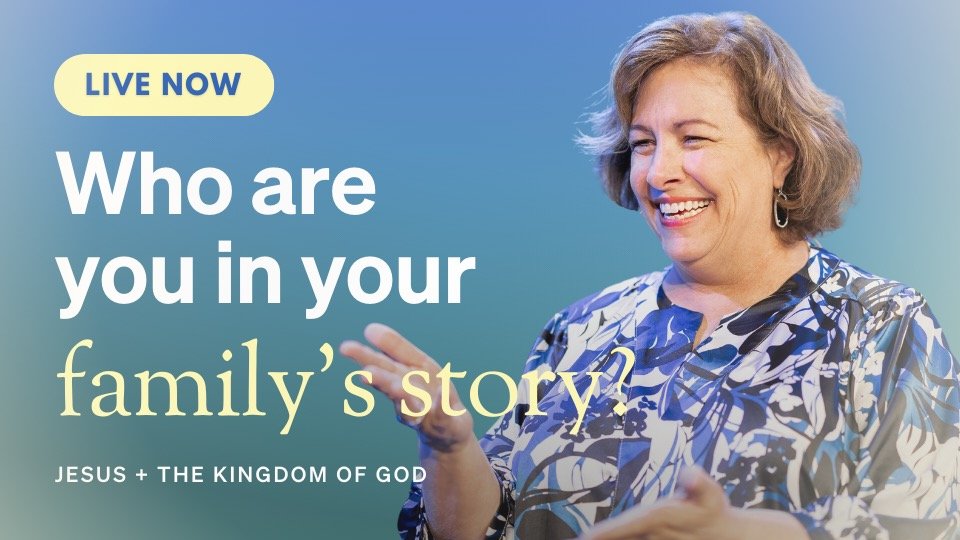How You Show Up Is Shaping Your Family
Trisha Taylor | Jesus and The Kingdom of God | Part 4 | Luke 15:11-32 | May 25, 2025
“The family seems to have two predominant functions: to provide warmth and love in time of need and to drive each other insane.”
Luke 15:11-32
11 Once there was this man who had two sons. 12 One day the younger son came to his father and said, “Father, eventually I’m going to inherit my share of your estate. Rather than waiting until you die, I want you to give me my share now.” And so the father divided his assets. 13 A few days passed and this younger son gathered all his wealth and set off on a journey to a distant land. Once there he wasted everything he owned on wild living. 14 He was broke, a terrible famine struck that land, and he felt desperately hungry and in need. 15 He got a job with one of the locals, who sent him into the fields to feed the pigs. 16 The young man felt so miserably hungry that he wished he could eat the slop the pigs were eating. Nobody gave him anything.
17 So he had this moment of self-reflection: “What am I doing here? Back home, my father’s hired servants have plenty of food. Why am I here starving to death? 18 I’ll get up and return to my father, and I’ll say, ‘Father, I have done wrong—wrong against God and against you. 19 I have forfeited any right to be treated like your son, but I’m wondering if you’d treat me as one of your hired servants?’” 20 So he got up and returned to his father. The father looked off in the distance and saw the young man returning. He felt compassion for his son and ran out to him, enfolded him in an embrace, and kissed him.
21 The son said, “Father, I have done a terrible wrong in God’s sight and in your sight too. I have forfeited any right to be treated as your son.”
22 But the father turned to his servants and said, “Quick! Bring the best robe we have and put it on him. Put a ring on his finger and shoes on his feet. 23 Go get the fattest calf and butcher it. Let’s have a feast and celebrate 24 because my son was dead and is alive again. He was lost and has been found.” So they had this huge party.
25 Now the man’s older son was still out in the fields working. He came home at the end of the day and heard music and dancing. 26 He called one of the servants and asked what was going on. 27 The servant said, “Your brother has returned, and your father has butchered the fattest calf to celebrate his safe return.”
28 The older brother got really angry and refused to come inside, so his father came out and pleaded with him to join the celebration. 29 But he argued back, “Listen, all these years I’ve slaved for you. I’ve never disobeyed one of your orders. But how many times have you even given me a little goat to roast for a party with my friends? Not once! This is not fair! 30 So this son of yours comes, this wasteful delinquent who has spent your hard-earned wealth on his selfishness, and what do you do? You butcher the fattest calf from our herd!”
31 The father replied, “My son, you are always with me, and all I have is yours. 32 Isn’t it right to join in the celebration and be happy? This is your brother we’re talking about. He was dead and is alive again; he was lost and is found!”
A story doesn’t tell us what to think.
How am I like the younger brother? How am I like the older brother? How am I like the father?
Research tells us that there are two things that have to be in place for us to feel loved in our closest relationships . . . there has to be a sense that “You’re there for me” and “I matter to you.”
The older brother
He is angry
Exaggerates his own position
Is self-righteous
We do all those things when we’re hurt and angry . . .
His feelings are justified and neither the father in the story nor Jesus seem to condemn him.
Tempted to hang on to the superior position.
The older brother is going to want to hold it over both of their heads, always feeling like the victim and always feeling a little superior.
He has to learn not to rely on rules and obligations to exchange for love, that doing everything right doesn’t make you better than anyone else.
The Father
He takes the initiative; love pursues
The Father’s love is not controlling
He runs toward his son
He understands boundaries
“Everything I have is yours”
The Younger Son
He’s taken the initiative to go back home, to start the conversation.
The importance of apology
Learn to let go of shame
No one is the worst thing they’ve ever done.
Where are you in this story?
In your family, do you need to stop blaming and come into the party?
Do you need to take the initiative to reach out to others, even those who are frustrating and immature?
Is it finally time for you to apologize and ask forgiveness?

